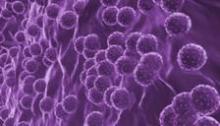A newly identified interferon gene known as IFNL4 is associated with impaired clearance of hepatitis C virus, results from a novel study demonstrated.
In an article published online Jan. 6 in Nature Genetics, the results of the study suggest that therapeutic inhibition of IFNL4 "might represent a novel biological strategy for the treatment of HCV and HBV infection and possibly other diseases, and IFNL4 genotype could be used to select patients for this therapy," wrote Ludmila Prokunina-Olsson, Ph.D., and her colleagues.
They described IFNL4 as "related to but distinct from known IFNs and other class 2 cytokines. The 179 amino acid open reading frame of the IFNL4 transcript is created by a common deletion frameshift allele of ss469415590, which is a dinucleotide variant strongly linked with rs12979860" – a genetic marker strongly associated with HCV clearance. The gene is located upstream of IFNL3 on chromosome 19q13.13.
Dr. Prokunina-Olsson, of the Laboratory of Translational Genomics in the Division of Cancer Epidemiology and Genetics at the National Cancer Institute, and her associates performed the RNA sequencing experiment in a sample of primary human hepatocytes treated with polyinosinic:polycytidylic acid, a synthetic mimic of double-stranded HCV RNA. The sample was taken from a liver donor who was heterozygous for rs12979860 and uninfected with HCV (Nature Genetics 2013 Jan. 6 [doi: 10.1038/ng.2521]).
The researchers found that compared with rs12979860, ss469415590 was more strongly associated with HCV clearance in individuals of African ancestry (P = .015), while these variants behaved similarly in individuals of European ancestry.
They also discovered that IFNL4 "induces STAT1 and STAT2 phosphorylation, activates ISRE-Luc reporter and ISGs, and generates antiviral response in hepatoma cells," they wrote. "The mechanisms by which IFNL4 induces these responses but nevertheless impairs HCV clearance are currently under investigation."
The study was funded by grants from the National Cancer Institute and the National Institute of Diabetes, Digestive, and Kidney Diseases.




